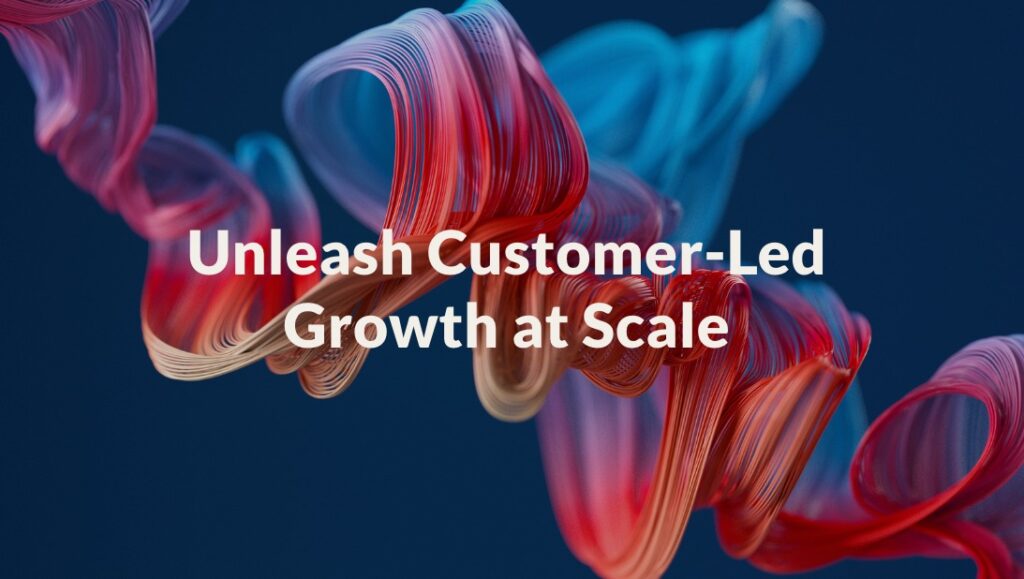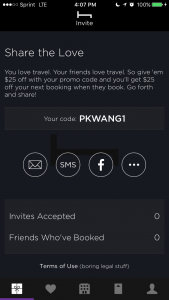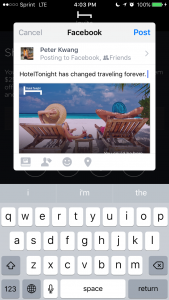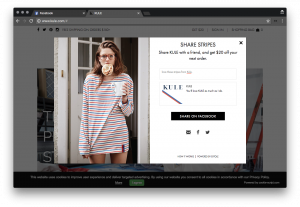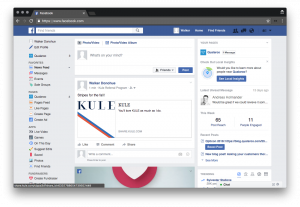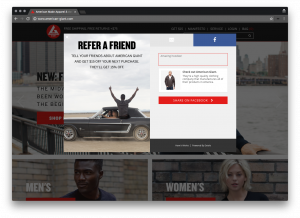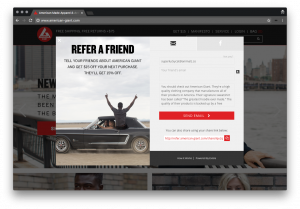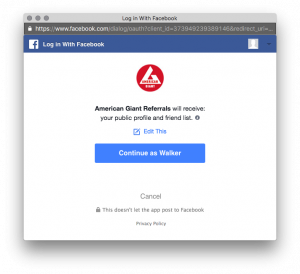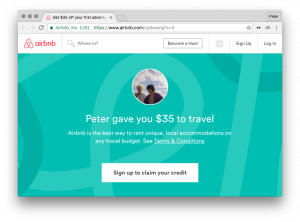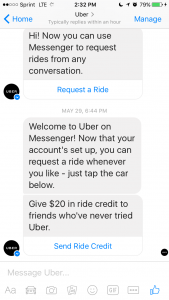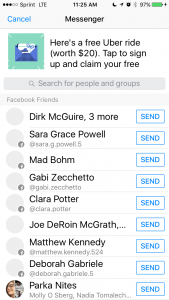In 2023, Facebook had over 3 billion monthly active users. Yes, nearly half the world’s population has a Facebook account. Although Facebook may not be as exciting as YouTube or as cool as TikTok, it’s still the most popular social network in the world. This means it’s pivotal for acquiring new customers, amplifying your brand’s reach, and nurturing existing relationships.
But while Facebook presents a massive opportunity for brands trying to amplify their reach, the pitfall they often fall into is taking the same approach to Facebook that they would a TV ad or a billboard. With over three million businesses advertising on Facebook, your customers’ feeds are already saturated with one company’s wares after another.
What makes Facebook such a powerful channel for your company isn’t simply the fact that people are always on it. It’s that they’re on it with their friends and family.
That’s why Facebook referrals are such an effective customer-led growth strategy. Facebook connects your customer advocates with their social graph. It doesn’t just get your brand in front of the people who already like your company’s Facebook page or in an advertising window — it gets you straight in your target audience’s feeds from people they actually know.
A Primer on Facebook Referrals
When a customer shares your brand through a recommendation on Facebook, your brand’s reach is amplified because the referral message appears in all their friends’ feeds.
At Extole, an internal analysis of over 400 referral programs revealed almost a 1:1 ratio on Facebook between customer advocates sharing your brand and friends clicking through to your website.
Here’s what you need to know to win with referral marketing on Facebook.
1. Make it Easy for Advocates to Share on Facebook
The best way to get advocates to share your brand on Facebook is to guarantee that they know they can share on Facebook.
HotelTonight is an excellent example of this. The company has leveraged marketing strategies like referral to compete in an industry where companies like Expedia and Priceline.com operate with billion-dollar digital marketing budgets.
The company’s secret for Facebook referrals is simple: make the referral experience beautiful, seamless, and easy.
The first tab of HotelTonight’s app is devoted to recommending the app, and without any legalese, clearly states the referral offer—“give ’em $25 off with your promo code and you’ll get $25 off your next booking when they book.”
By using a hybrid sharing program, Hotel Tonight provides customers with multiple ways to share. The mobile app uses custom APIs to optimize email, SMS and Facebook sharing while it leverages native iOS sharing for alternate apps customers might prefer, like Twitter or WhatsApp.
Using a custom API for Facebook means that HotelTonight can customize the referral experience on Facebook. All advocates have to do is tap the Facebook button and post, all without leaving the app—it’s that easy. Referring a friend on Facebook becomes a seamless part of HotelTonight’s customer experience.
Takeaway: The first and easiest action you can take is to include a Facebook logo and link on your referral landing page.
2. Personalize the Share Message
Referral marketing is so powerful because it replicates organic word-of-mouth sharing. At Extole, we’ve repeatedly found that personalized share messages from advocates lead to higher clickthroughs and conversions.
Kule, the e-commerce clothing brand, fosters personalized sharing by requiring the advocate to fill in a personal message to share and refer on Facebook.
Takeaway: The strength of referral marketing on Facebook is that your friends, whom you know and trust, recommend things they like to you. Rather than making the referral message seem like just another Facebook Ad, referrals become targeted and personalized to the people on the other end.
3. Don’t Be Creepy
When your customers decide to share your brand on Facebook, understand that they’re allowing you into their personal network of contacts and friends.
Only ask for the permissions you actually need. Asking your customers for permission to post on their behalf, requesting their personal contact and phone number, and asking to see their history of likes are all surefire ways to spook them away.
Tailoring your ask will reduce the friction and thought they have to put into sharing and increase the number of customers who choose to do so.
American Giant’s referral program is a perfect example and makes sharing on Facebook a seamless, three-step process:
- Advocates click on the Facebook tab to share and enter a personalized message.
2. Enter an email to receive rewards.
3. Log into Facebook and allow access to public profile and contact list.
It’s that easy.
The takeaway: Make sharing easy and low-risk for your customers by limiting the permissions you request when they grant you Facebook access.
4. Provide Context for New Customers
Along with personalizing the share message, it’s crucial that you maintain context for your customers throughout the referral experience. Your customers spend 30+ minutes a day on Facebook’s platform, which also happens to be engineered to increase this number. When you take them outside of the app, don’t take them to a generic landing that breaks the context of where they’re coming from.
Airbnb counters this by using the advocate’s social profile photo to create a customized landing page for friends. When friends click a referral message in their Facebook feed, this is the first thing they see:
By increasing personalization across platforms, the Airbnb team was able to use referral to increase bookings by 25%.
The Takeaway: Creating a unified experience across Facebook, your website, and your mobile app is increasingly important as users become more reluctant to leave their social feed. Show them that their friends are already there, and they’ll be more likely to both convert and refer.
5. Build a Chatbot
We can’t talk about Facebook without talking about Facebook Messenger. Private messaging apps like Messenger have now overtaken social networks in terms of active users. They allow users to connect with their friends and, through increasingly sophisticated bots, pay their bills, check the weather, and shop online.
Facebook Messenger alone has over 900 million monthly active users, and at Extole, we’re incredibly excited by the opportunities it provides for referral and sharing.
Uber’s Messenger chatbot is a good example. It allows users to both request a ride and refer their friends to Uber, all within Messenger:
Through Uber’s Messenger chatbot, advocates who want to refer their friends don’t have to enable permission or even go to the Uber app to spread the word. They can just tap “Send Ride Credit,” scroll through a list of their Facebook friends and mobile phone contacts who aren’t on Uber, and refer.
While getting your referral message shared onto your customers’ feeds is a powerful way to tap into broadcasting sharing, Facebook Messenger allows for 1:1 sharing that your brand can monitor and track, unlike the “dark social” category of traditional SMS and email.
Uber’s chatbot on Facebook Messenger for referral is a good case study for brands who want to create a seamless and responsive referral program on mobile without building a mobile app from scratch.
Great Referral Meets Your Customers Where They Are
Traditional Facebook ads are expensive, and stop sending traffic as soon as you stop investing in them. Conversely, leveraging your existing customer base for Facebook referrals is a less expensive way to harness the power of customer-led growth.
Of course, a great customer engagement platform is essential for creating and managing great referral offers. Our software maximizes engagement and referrals for desktop and mobile users so that no element of your referral program is left behind.
Check out Extole’s full spectrum of customer engagement opportunities.

